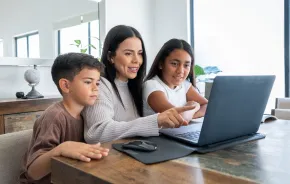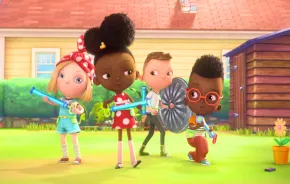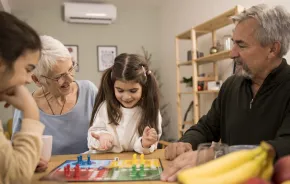
Editor's note: We are republishing this article in the wake of the devastating news of the May 24 shooting at Robb Elementary School in Uvalde,Texas that has left 19 students and two teachers dead. This is the deadliest elementary school shooting since the massacre at Sandy Hook Elementary in Newtown, Conn. in 2012.
If it bleeds, it leads. The old newsroom adage about milking stories for sensationalism seems truer than ever today. And with technology doing the heavy lifting — sending updates, tweets, posts and breaking news alerts directly to our kids' phones — we parents are often playing catch-up.
Whether it's wall-to-wall coverage of the latest natural disaster, a horrific mass shooting, a suicide broadcast on social media, a violent political rally or coverage of war, it's nearly impossible to keep the news at bay until you're able to figure out what to say. The bottom line is that elementary school-age kids and some middle schoolers have trouble fully understanding news events. And though older teens are better able to understand such events, even they face challenges when it comes to sifting fact from opinion — or misinformation.
No matter how old your kids are, threatening or upsetting news can affect them emotionally. Many can feel worried, frightened, angry or even guilty. And these anxious feelings can last long after the news event is over. So, what can you do as a parent to help your kids deal with all this information?
Addressing news and current events: Tips for all kids
Consider your own reactions. Your kids will look to the way you handle the news to determine their own approach. If you stay calm and rational, they will, too.
Take action. Depending on the issue and kids' ages, families can find ways to help those affected by the news. Kids can write postcards to politicians expressing their opinions; families can attend meetings or protests; kids can help assemble care packages or donate a portion of their allowance to a rescue, humanitarian or advocacy effort. Check out websites that help kids do good.
Tips for kids younger than 7
Keep the news away. Turn off the TV and radio news at the top of the hour and half hour. Read the news out of range of young eyes that can be frightened by the photos (kids may respond strongly to images of other kids in jeopardy). Preschool kids don't need to see or hear about something that will only scare them silly, especially because they can easily confuse facts with fantasies or fears.
Stress that your family is safe. At this age, kids are most concerned with your safety and separation from you. Try not to minimize or discount their concerns and fears, but reassure them by explaining all the protective measures that exist to keep them safe. If the news event happened far away, you can use the distance to reassure kids. For kids who live in areas where crime and violence is a very real threat, any news account of violence may trigger extra fear. If that happens, share a few age-appropriate tips for staying and feeling safe (e.g., being with an adult, keeping away from any police activity).
Be together. Though it's important to listen and not belittle their fears, distraction and physical comfort can go a long way. Snuggling up and watching something cheery or doing something fun together may be more effective than logical explanations about probabilities.
Tips for kids ages 8–12
Carefully consider your child's maturity and temperament. Many kids can handle a discussion of threatening events, but if your kids tend toward the sensitive side, be sure to keep them away from the TV news; repetitive images and stories can make dangers appear greater, more prevalent and closer to home.
Be available for questions and conversation. At this age, many kids will see the morality of events in stark black-and-white terms and are in the process of developing their moral beliefs. You may have to explain the basics of prejudice, bias, and civil, political and religious strife. But be careful about making generalizations, since kids will take what you say to the bank. This is a good time to ask them what they know, since they'll probably have gotten their information from friends, and you may have to correct facts.
Talk about — and filter — news coverage. You might explain that even news programs compete for viewers, which sometimes affects content decisions. If you let your kids use the internet, go online with them. Some of the pictures posted are simply grisly. Monitor where your kids are going and set your URLs to open to non-news-based sites.
Tips for teens
Check in. Since, in many instances, teens will have absorbed the news independently of you, talking with them can offer great insights into their developing politics and their senses of justice and morality. It will also help you get a sense of what they already know or have learned about the situation from their own social networks. It will also give you the opportunity to throw your own insights into the mix (just don't dismiss theirs, since that will shut down the conversation immediately).
Let teens express themselves. Many teens will feel passionately about events and may even personalize them if someone they know has been directly affected. They'll also probably be aware that their own lives could be affected by violence. Try to address their concerns without dismissing or minimizing them. If you disagree with media portrayals, explain why so your teens can separate the mediums through which they absorb news from the messages conveyed.
Additional resources
For more information on how to talk to your kids about a recent tragedy, please visit the National Association of School Psychologists or the American Psychological Association. For more on how news can impact kids, check out News and America's Kids: How Young People Perceive and Are Impacted by the News.
This article was originally published by Common Sense Media and has been republished here with permission.











